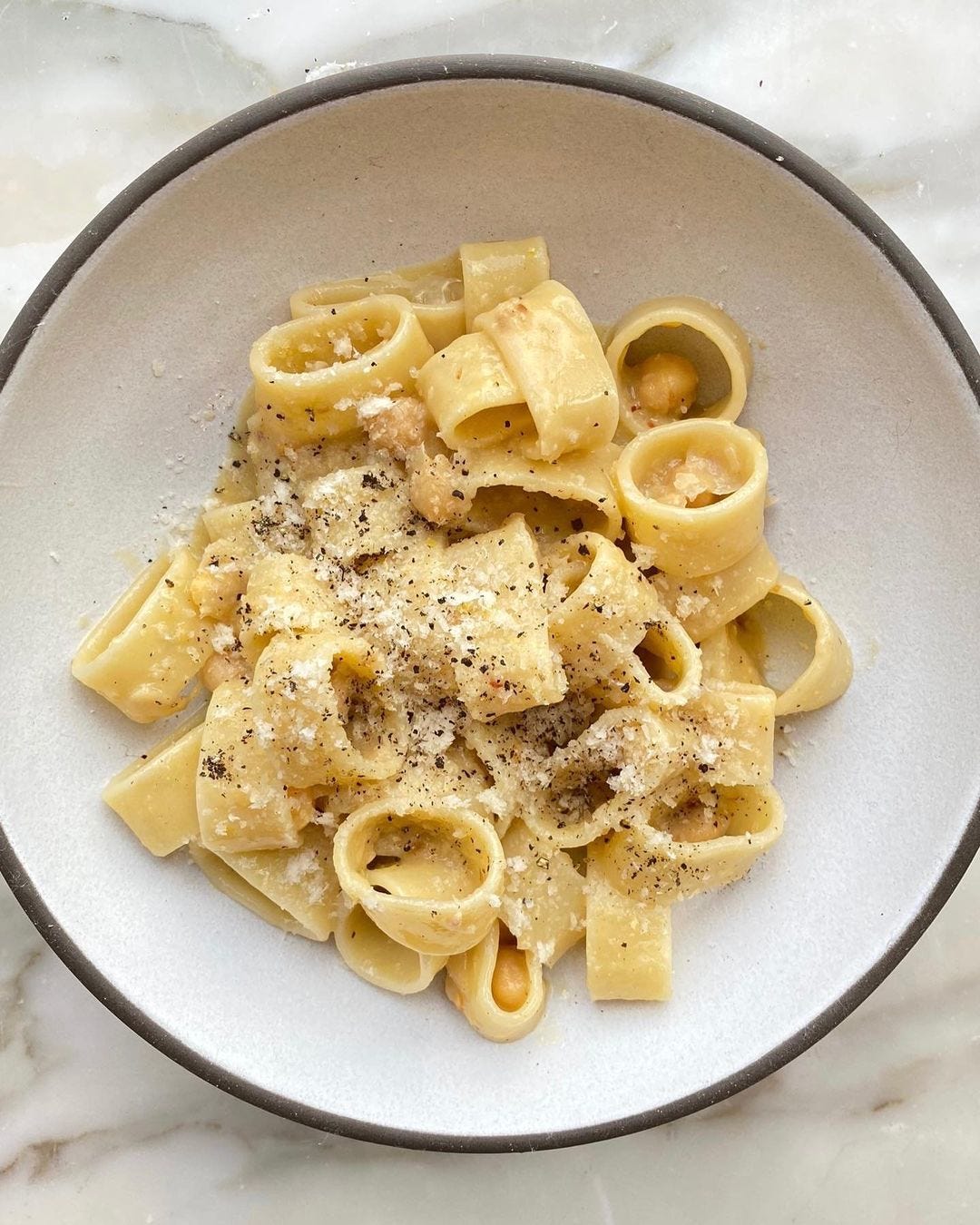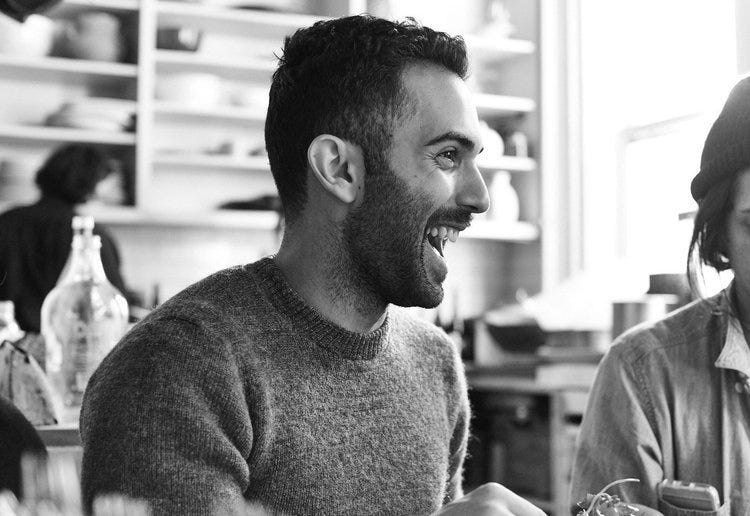Andy Baraghani's cooking is deeply personal
The former Bon Appétit chef on developing recipes, his work in food media, and how his Iranian heritage influences his cooking.
Why hello there! Welcome to on hand! If you’ve landed here and somehow aren’t subscribed, I got you:
If you’ve been a reader of Bon Appétit over the last few years, you no doubt know of Andy Baraghani. Know for his bold, highly achievable flavors, he was a mainstay across the publication’s YouTube page, podcast, and print media as a food editor and recipe developer.
In 2021 he left to strike out on his own and work on his first cookbook, The Cook You Want To Be. The book draws inspiration from his Iranian upbringing and training at legendary restaurants like Chez Panisse and Estela, and a few recipes from his book have already become regulars in my kitchen. A few weeks after his book tour came to an end, Andy and I chatted about developing recipes, his work in food media, and how his Persian heritage influences his cooking.
Brianna Plaza: Do you want to tell me a little bit about your background and your path from restaurants to cookbook writing?
Andy Baraghani: I very much started off working in restaurants in California and New York, and eventually made the switch to food media and really started writing about food, specifically developing recipes and writing about regional cuisines.
I knew that I wanted to work in food my whole entire life. The more and more I think about it, I realize that’s quite unique in this industry. I was very much enamored by all things related to food at a very, very young age, to the point that I was experimenting in my parents' kitchen when I was a kid and in my teenage years. And then by the time I was 16, I pushed my way into an internship at Chez Panisse in California, worked my way up there and then worked at a few restaurants in the Bay Area, then worked in Paris, came to New York to NYU to go to school. But while I was in college, I was still working in restaurants and doing internships in food media.
I eventually left the world of restaurants, graduated from college, and made the switch to food media full time in, I think, 2013, and became the food editor at Tasting Table. I was brought on to rethink how the recipes were written, the creative direction, and the style of the recipes for the digital publication. And then my work there got noticed by Bon Appétit, and I ended up going over there as an editor where I really started to develop recipes. That was kind of my bread and butter, and then I started writing about food and travel a lot. Eventually my role expanded to hosting the podcast occasionally and doing a lot of videos for their YouTube channel.
I think one big breakthrough while I was there was writing an essay about how food has helped me have a deeper understanding of both my ethnic and my sexual identity. That essay brought some attention to my writing where I ended up getting a book agent and writing a book proposal.
I don't think I necessarily knew I wanted to be in food media. I think I did have an understanding though, after spending some years in restaurants, that there were many other opportunities to explore. That's why I started dipping my toes in by interning in test kitchens and then eventually making the switch.
Brianna Plaza: When you develop recipes, how much of your personal style is reflected versus what is trendy or needed for marketing?
Andy Baraghani: Well, I would say whether it was Bon Appétit, Tasting Table, Saveur, or all the places that I've contributed to, there's obviously a style guide for each of these places that you have to go by. I think where it's definitely clear to me is, well, I didn't necessarily fully know how to put my personal touch to a recipe right off the bat. I obviously had a love for food and cooking, but when I started developing recipes, I think in the very beginning, it was more like, oh, how do I make it look right or fancy or just the best it can be? And I wasn't necessarily thinking about the home cook right off the bat. And eventually, and this was very much when I was at Bon Appétit, I had this conversation with myself of if I can’t make a recipe in my tiny studio kitchen, then I'm not going to develop it.
But I would say the reason why I've probably had — I think I could say this — a level of success in this industry, is because my food is quite personal, and I don't think I develop foods that are not natural to me. I wouldn't say my food is trendy, nor do I necessarily like to even think about food trends or whatnot. It needs to come naturally to me.
There have been moments that I've had to develop recipes that certainly had nothing to do with anything that I grew up with or wanted to do. I remember having to do a popcorn ball or a tuna casserole, which actually turned out great, but I had no connection to it. And I think for me, it's very important for me to have a connection, whether it's to that culture, the ingredients, the techniques. I need to have a little bit of me in there.

Brianna Plaza: What prompted you to leave mainstream food media and go off on your own?
Andy Baraghani: Well, a big part of it was that I needed to finish my book. And I think I am a Sagittarius through and through, and I think I like change. I want change in many aspects of my life, whether it's changing up the ingredients to a recipe, to the interiors of my home, or to my jobs. I want to keep my brain stimulated and moving. I think I was probably ready to leave two years prior to when I actually had left.
But I think mostly because I felt like I really learned a lot and I accomplished a lot more than I even could have imagined. And so I was ready to move on to do something else.
Brianna Plaza: In the book, you have a few building-block sections like the mighty sauces. Can you walk me through the decision to create a section like that and how they’re incorporated into the rest of the book?
Andy Baraghani: So what I've noticed working as an editor in my past life and looking through many, many, many cookbooks is when there is a section of sauces or kind of smaller recipes, they're always in the end of a cookbook the majority of the time. And I’ve never understood that. So I wanted to make sure that I start the book with a collection of smaller recipes that are essential to the home cook and the reader. Not only because they’re going to be used throughout the book, but they’re also written in a way to empower the home cook and reader to use them on all sorts of things outside this book. That is something that I wanted to make sure that they use and love and that they play with.
Brianna Plaza: Your Iranian heritage is featured quite prominently in the book, and I feel like that's somewhat uncommon outside of dedicated Iranian cookbooks. Can you talk about the decision to weave that into the book and why you chose the recipes that you chose?
Andy Baraghani: I'm a first generation Iranian American. I don't think that food has gotten enough representation. There are amazing Iranian cookbooks out there, and there's so many great Iranian food writers and cookbook authors that I really admire and love, but I knew I didn’t want to write an Iranian cookbook as my first book. As much as I love that food and those flavors — and they’ve had such a big impact on my approach to food and cooking — it is only one aspect of me as a cook. It's an important aspect, but it's just one aspect. So I knew that it would be part of this book, but it wouldn't take over in that sense. It comes in with certain flavors and ingredients, but then it also very much comes in with very specific dishes that are just very Iranian.
Whether it's Iranian food or any other culture, you want to present the reader and the home cook with the understanding of the base recipe. Not to say that there is one perfect way or the correct traditional way to make a specific dish. I put my own interpretation on it or use different techniques I’ve learned in restaurants, but I think there should always be context provided before you try to do a complete variation and riff off of the dish. That's what I try to remember.
Brianna Plaza: How do you define success and how do you define kind of what comes next?
Andy Baraghani: It varies, I have to say. I think for me, it's accomplishing something new and challenging myself in succeeding. I think success isn't necessarily a certain award or recognition from the outside. It could very much come within. And so I think something that's very natural to me and I tried to apply in many aspects of my life is to challenge myself in little, medium and big ways. And that doesn't mean that I need to be succeeding the first time, but challenging myself is already a big thing, and then being able to overcome those challenges I think is a way of finding success.




